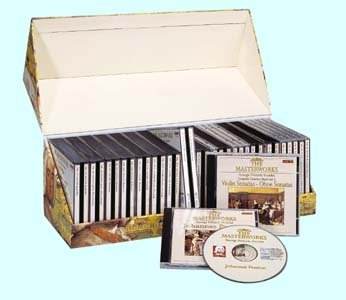Handel’s ‘German Arias’
were probably written in the late 1720s
and like the Brockes Passion, set texts
by Heinrich Brockes from a collection
called ‘The Terrestrial pleasure in
God’. The texts are an illustration
of an idealised vision of the world
and Handel’s settings require an interpreter
who can combine the virtuosity of Handel’s
vocal lines with a poetic interpretation
for the text itself. These were Handel’s
last works in German and remained unpublished
during his lifetime. The reasons for
their composition remain obscure as
most of his London soloists would be
unlikely to sing in German and these
are chamber pieces rather than large-scale
arias. Nonetheless, the music is ravishingly
beautiful and the German Arias are nine
miniature masterpieces.
Arleen Auger’s voice
is perfectly suited to these works.
One or two awkward top notes apart,
she navigates Handel’s vocal lines easily
and is well attuned to the text and
to its poetic resonances. These are
charming, easy performances which lack
the darkness that Dorothea Roschmann
brings to them in her recording. This
is large-scale chamber music and Auger
is lucky in the members of her ensemble,
who play the accompaniments sensitively.
All artists are responsive and you feel
that they are making real chamber music.
Repeated listening
made me sometimes feel that the speeds
were constantly on the steady side.
Though this aids the clarity of Auger’s
performance, the instrumentalists’ smooth,
modern way with the music means that
the arias can plod a little, lacking
the sparkle and bounce that original
instrument groups bring to the pieces.
That said, the steady speeds never compromise
Auger’s line.
I still have a lingering
admiration for Emma Kirkby’s recording
of these works with London Baroque which
is regrettably now deleted. Kirkby’s
clear, open sounding voice is ideal
for this music and her speeds more varied.
There is a remarkable disparity between
the speeds of the two recordings. For
some of the arias, such as the first
one ‘Kunft’ger Zeiten eitler Kummer’,
there is not really much to choose between
the performers though Kirkby is marginally
faster. But for others, such as the
second ‘Das zitternde Glanzen der spielenden
Wellen’, Kirkby is much fleeter without
seeming rushed, making Auger’s performance
seem too solid. And in the penultimate
aria, ‘In den angenehmen Buschen’, Kirkby’s
speed is nearly double Auger’s. Whilst
Auger is convincing at her speed, as
soon as you hear Kirkby’s version you
feel you are hearing it sung at the
correct speed.
All this means that
Kirkby’s performance of the arias is
a remarkable 10 minutes shorter than
Auger’s. This gives the performers room
to intersperse the arias with the Violin
Sonata No. 6 (now known not to be by
Handel). These arias were probably not
written to be consumed in one go. It
is only our modern minds and the tyranny
of recordings that require complete
continuous performances. I feel that
this present recording would have been
immeasurably enhanced by interspersing
the arias with something instrumental.
But this is still an
eminently desirable disc. Auger’s artistry
is considerable and she is set off beautifully
by her responsive players.
Robert Hugill

